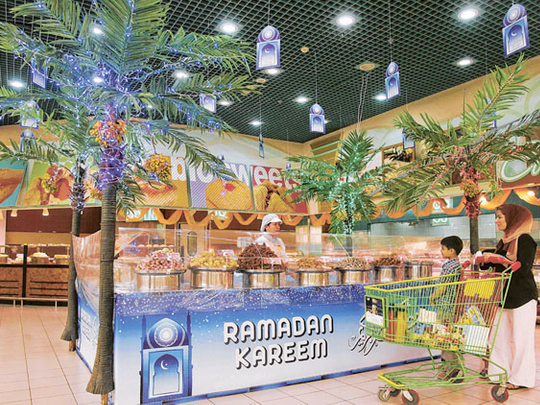
Dubai: Government inspectors will be visiting retailers to ensure that they are not raising food prices during Ramadan, according to an official at the Department of Economic Development (DED).
The DED will go on 15 planned inspections of most retail outlets during Ramadan, Abdullah Al Shehi, Director of Commercial Protection at DED, told Gulf News.
Inspectors will check whether retailers are raising the prices of basic commodities that the Ministry of Economy (MOE) has fixed starting from Ramadan until the end of the year.
Depending on the number of violations, retailers will face fines of up to Dh20,000 if they raise their prices.
Last week, representatives from DED and MOE met sellers at the fruit and vegetable market in Aweer, telling them not to let supplies run low and to keep prices fixed during Ramadan, he said.
Food prices tend to skyrocket and supplies of some goods dwindle during Ramadan, which begins in August this year, due to the increase in demand during the month.
Vigil
In July, officials are planning 10 inspections of warehouses storing food supplies to monitor cheating on product expiry dates and on descriptions or duplicates, he added.
This month inspectors are focusing on the consistency of prices between major retail outlets and small groceries. "Other shops like groceries should not exploit these products [by] buying them from the retail outlets then raise their prices at the groceries. There will be monitoring of this issue," he said.
Groceries may be fined up to Dh10,000 for this consumer exploitation, he added.
The DED has a team of 80 inspectors covering Dubai with planned and random inspections. The number of visits depends on the changes in the market, he said.
Profit margins
Retailers' profit margins are being squeezed as global food prices increase, but they are required to fix the costs of basic commodities.
Retailers have applied to the DED and Ministry of Economy for permission to increase prices but it is the Supreme Council for Consumer Protection that has the final say, he said.
Retailers must justify the reasons for a price increase considering factors such as rent, global prices and tightening profit margins, he added, but could not comment on the number of applications or approvals.
Costs to be fixed
Retail outlets across the country have agreed to fix the cost of hundreds of commodities — including chicken, sugar, vegetable oil and tea bags — in a bid to fulfil their corporate social responsibilities.
The campaign, which runs until December 31, features 70 outlets in the UAE including branches of Carrefour, Spinneys, Lulu Hypermarket and the cooperative societies.
The prices have been divided into three categories: some outlets are fixing commodity prices regardless of fluctuations in the market, some retailers are reducing the cost of selected goods to 50 per cent and others are fixing prices at purchase cost.












